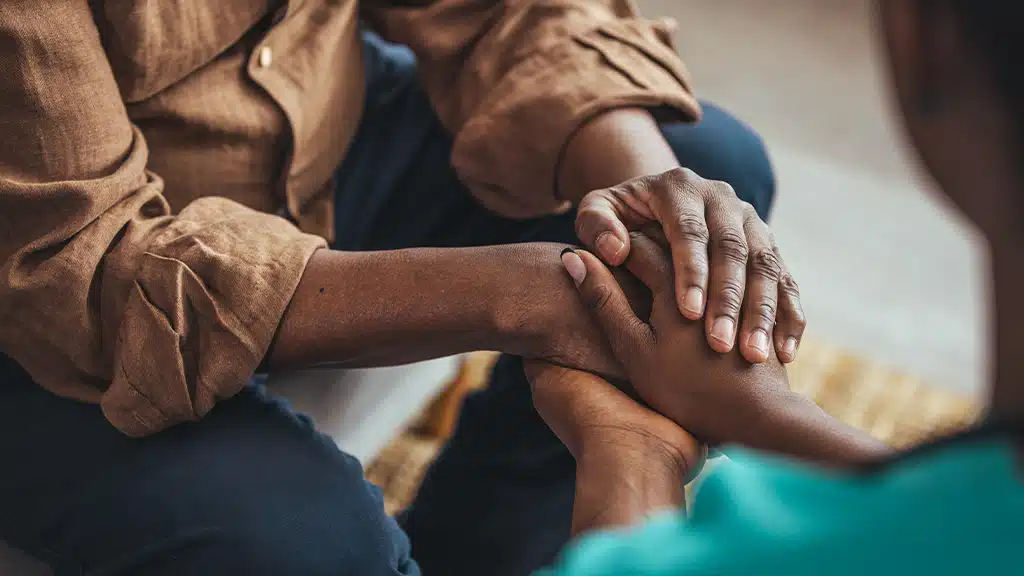Saprea > Online Healing Resources >Common Symptoms: Sexual Intimacy Issues
What Are Sexual Intimacy Issues?
Sexual issues are common among people of varied backgrounds and beliefs, and proof of that can be found by surveying the shelves of the local drugstore; there are plenty of products that promise more comfort, improved endurance, or increased sensitivity—all an indication that sexual issues are common and troubling to those who experience them.
In fact, recent studies have shown that 43% of women and 31% of men report experiencing some degree of sexual issues.1 Difficulties with sex can be short-term or long-lasting and can be initiated (or amplified) by stress, medical conditions, genetics, and hormones. They include a wide range of challenges such as:
- Struggling to become aroused.
- Struggling to experience an orgasm.
- Experiencing high levels of pain or discomfort.
- Experiencing high levels of stress or anxiety.
- Avoiding sex due to fear, anxiety, or low self-esteem.
While these sexual issues and more are common in the general population, survivors of child sexual abuse may experience additional challenges as a result of childhood trauma.
Why Do Survivors of Sexual Abuse Experience Sexual Issues?
Because sexual abuse is inherently sexual, sex may serve as a physical, mental, or emotional reminder of the abuse. This is a very natural response considering the limbic system’s efforts to keep a person safe from trauma and other unpleasant experiences. For example, think about a time you’ve eaten a lot of one kind of food and then gotten sick. It’s likely that you feel some resistance to eating that food again because your mind and body remembers what happened in the past. Certainly you can get to a point where you can eat that food again, but it will probably be a process involving small steps. Overcoming sexual issues that are a result of or connected to childhood sexual trauma is also going to be a process involving small steps.
What Are Common Sexual Issues in Survivors of Sexual Abuse?
Survivors may associate sexual arousal with feelings of shame and guilt, especially if they experienced sexual arousal during their abuse. Even though such responses are natural and do not in any way mean the survivor consented to or enjoyed the abuse, it can be difficult for survivors to untangle feelings of shame and betrayal from feelings of sexual pleasure and intimacy. This shame that continues into adulthood can feel like a barrier that hinders a survivor’s enjoyment of or participation in sexual activities. It may impact how a survivor perceives their body, as well as their wants and needs as a sexual being. It can impact current relationships, experiences, and the type of affection a survivor feels they are deserving of.
It also is common for survivors of sexual abuse to experience disinterest in sexual activity. Sometimes survivors, despite romantic interest and commitment, may feel triggered by activities or environments that remind them of the circumstances surrounding the abuse. Other survivors experience pain and/or discomfort during intercourse (often referred to as vaginismus) which may be related to the limbic system’s efforts to protect the body from trauma by responding with physiological cues (like pain).
Other survivors may feel nothing at all during intercourse, experiencing an emotional numbness. In more serious situations, survivors may dissociate altogether. In these instances, a survivor may feel so disconnected from their mind and body that they lose time during intercourse, unable to remember what happened or how long they dissociated. Some survivors may also experience dissociation to such a severe degree that they feel as though they have left their body and are watching the intercourse take place from a third-person point of view.
Again, such unwanted and disruptive responses are often due to the limbic system being triggered by something in your environment or circumstance associated with your past abuse. You may even be triggered by your sexual partner during intercourse, despite them being someone you fully trust and feel entirely safe with. Whatever the trigger may be, the alarmed limbic system will want to protect you from further danger by placing distance between yourself and the situation you are in, even if that situation is one you were willing and excited to enjoy.
Still other survivors may feel like sex is required to be loved, or that their bodies are the only thing they have to offer in a relationship. They may focus on and frequently participate in risky sexual behaviors (often referred to as “hypersexual”).
How to Cope with Sexual Intimacy Issues
While sexual issues are quite common among the general population, survivors of sex-related trauma can have an especially difficult relationship with their sexuality and sexual well-being. Fortunately, there are ways to help reduce the shame, confusion, and fears survivors may experience when it comes to sexual intimacy. And no matter where you are at in your healing journey and what your current mindset regarding sex is, we want to reiterate that it is possible to have a healthy relationship with sexuality after sexual abuse.
Resources to Help With Sexual Intimacy Issues

Sexual Health

Assertive Communication

